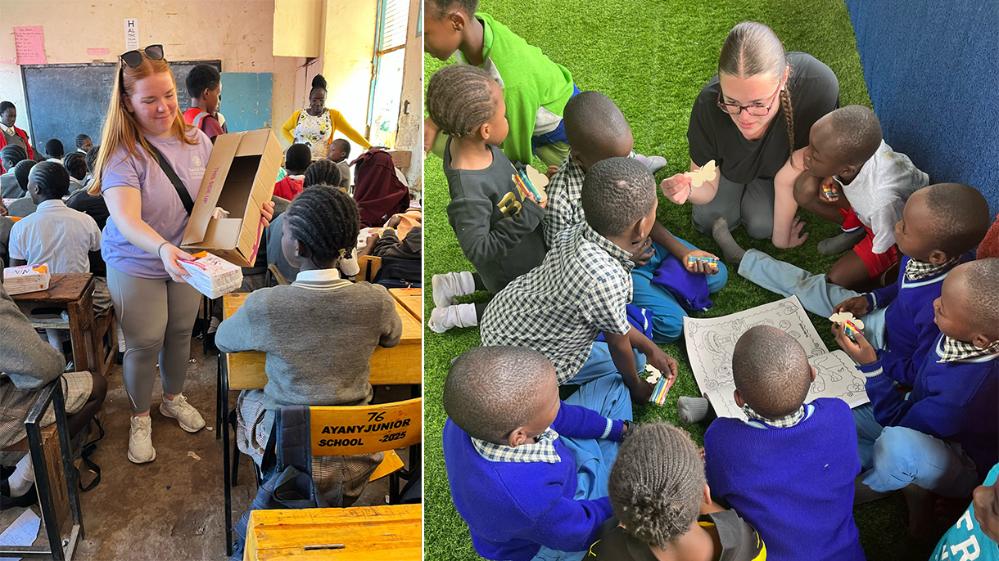Global Service-Learning Reaches Kenya
Seven students joined SHU’s first Africa-based service-learning trip to support girls and families in Kenya
Key Highlights
- Trip Overview
- Destination: Nairobi, Kenya for two weeks during summer break
- Program type: Global service-learning trip—Sacred Heart University’s first program on the African continent
- Community Impact
- 600+ dignity kits distributed, including pads and underwear for girls and boxers for boys
- $2,500 raised via GoFundMe, plus 30 donated packages of pads from Period.org
- Digital literacy sessions for adult learners on computer basics and typing
- After-school engagement with Kenyan students through dance and creative activities
- Food-relief initiative: Students helped prepare and serve meals to local families
Seven Sacred Heart University students spent two weeks of their summer break in Kenya on SHU’s first global service-learning trip to Africa.
Led by Jonix Owino, assistant psychology professor, the group partnered with two community-based organizations to address matters pertaining to reproductive health, mental health education and food access. Owino worked with Sacred Heart’s community engagement team to perform a site assessment in Nairobi, reviewing housing, safety and community partnerships.
The Kenya trip expands the University’s longstanding global service-learning initiative, which offers students immersive opportunities to apply academic knowledge through hands-on service abroad.
Empowering girls and normalizing menstrual health
Working alongside the Agape Woman and Child Empowerment Foundation (AWACHE), a nonprofit organization that supports teen mothers and highlights the importance of reproductive health education, the team helped deliver lessons on menstrual health to students in a local school. SHU students launched a GoFundMe and raised $2,500 to purchase sanitary napkins for distribution, and interdisciplinary studies major Isabella Paul ’29 secured 30 packages of pads from the organization Period.org. The cohort distributed more than 600 dignity kits, including pads and underwear for the girls, and boxers for the boys.
“Many girls miss school because they cannot afford sanitary products,” said Owino. “By providing supplies and engaging both boys and girls in the discussion, our students helped break stigma and promote understanding.”
Building digital and community capacity
The team also volunteered with Christian Based Camps of Kenya (CBCK), which offers youth programs, adult computer literacy classes and food relief services. Sacred Heart students assisted adult learning in basic computer skills, such as typing and software navigation. They also took part in an after-school program, interacting with young pupils.
“Students saw firsthand how small actions—teaching a digital skill or serving a single meal—can have enormous meaning when done in partnership and humility,” said Owino.

Cultural and academic exchange
In addition to service, the Sacred Heart team joined a cultural exchange at the University of Nairobi’s psychology department. Students from the universities compared perceptions of mental health across cultures, exploring how belief systems and language shape care-seeking behaviors. They visited the Kenyan High Court, where they received an official welcome, which was broadcast nationwide.
The group also experienced a traditional Kenyan welcome dance at the airport, toured historic and cultural sites in Nairobi and joined a safari to get a firsthand look at Kenya’s diverse wildlife.
The Sacred Heart team visited one of the tribal communities where members live in huts with very minimal belongings. “That was a culture shock,” said Owino. “There was no electricity, no running water, nothing. All you need is a hut, a bed and a place to cook.”
Owino said the trip represents the University’s mission in tangible form. “Seeing students connect classroom learning to real community needs—while building cultural empathy—was powerful,” she said. “This is the kind of education that changes both hearts and minds.”
Lessons in service-learning
Paul came away with a new perspective. “Appreciate what you have. Comparison is the thief of joy,” she said. “In America, people are constantly comparing themselves, yearning for more, not appreciating what they have and only appreciating what they get for a short amount of time before moving onto the next thing. But, when we were in Kenya, the children especially, were extremely appreciative of everything they got, both experience-wise and materialistically.”
Exercise science major Sophia Patterson ’26 learned how stereotyped cultural perceptions can be. “When I went on a service-learning trip to Greece, people asked me how the food was or asked how pretty it was,” she said. “When I tell them I went to Kenya, they ask if I saw violence or if everybody was living in poverty. That is just not the case.”
Biology major Ava Neville ’26 noticed one sharp cultural contrast. “Here at home, it seems like so many people are only out for themselves,” she said. “The people of Kenya were so kind and welcoming and had such an all-hands-on-deck sense of community.”
“Going to Kenya with the students was such an incredible experience,” said Arlete Perez Paez, assistant director of community engagement. “They had the chance to volunteer with organizations that empower women through health education, a soup kitchen and after-school programs for kids.”
Paez continued, “What stood out the most was how open SHU students were to immerse themselves in the community and culture. It wasn’t just about service: It was about learning, connecting and growing together.”
Want to hear more from SHU? Subscribe to our newsletters to get the latest updates delivered right to your inbox.